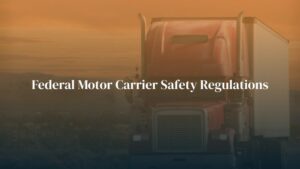The Federal Motor Carrier Safety Regulations (FMCSRs) are comprehensive rules enforced by the Federal Motor Carrier Safety Administration (FMCSA) to oversee commercial motor vehicles (CMV) on the roads.
Unfortunately, the regulations aren’t always followed, and accidents still occur. If you’ve been injured due to someone’s negligence as a result of violating one of these rules, you may have grounds to file a personal injury claim. If you’ve been involved in an accident, it’s crucial to speak with a Las Vegas truck accident lawyer to ensure your rights are protected and you receive the compensation you deserve.

Important FMCSRs to Be Aware of
The FMCSRs encompass a wide range of safety measures, all critical for the safe operation of commercial motor vehicles. Some of the most important ones to be aware of include:
Driver Qualifications
Ensuring that commercial drivers are properly qualified is fundamental to maintaining the safety and efficiency of motor vehicle operations on public roads. To obtain a CMV, drivers must meet the following criteria:
- Age Requirement: Drivers must be at least 21 years old. This requirement is in place to ensure that drivers have sufficient experience and maturity to handle the complex responsibilities of operating a CMV.
- Language Proficiency: Operators need to speak and read English adequately.
- Safe Driving: A requisite skill is the ability to safely operate the vehicle. This includes maneuvering in various traffic conditions and ensuring the safety of all road users.
- Physical Fitness: Drivers must meet health standards indicating they’re physically capable of handling the rigorous demands of the job, including long hours and the operation of heavy machinery.
- Licensing: Each driver must possess only one valid commercial motor vehicle operator’s license, issued by a single state or jurisdiction. This helps to prevent fraud and ensures that driver records accurately reflect their qualification and history.
- Road Test: Candidates must pass a practical road test or an equivalent, demonstrating their operational competency with a CMV.
- Disqualification: To maintain a high safety standard, drivers must not be disqualified under rules specified in 49 CFR 391.15. This includes avoiding offenses such as driving under the influence, committing felonies using the vehicle, and leaving the scene of an accident.
Hours of Service (HOS) Rules
The HOS rules limit driving hours, mandate rest periods, and require meticulous record-keeping.
The HOS regulations are central to the FMCSRs, primarily aimed at preventing accidents caused by driver fatigue. These rules specify the maximum number of daily and weekly hours that commercial drivers are allowed to work, including specific limits on the time spent driving.
Drivers must take a mandated rest period after a certain number of hours on the road, which is intended to ensure they have adequate rest before resuming driving duties. The HOS rules also require drivers to maintain accurate logs of their work and rest times, either through traditional paper logs or electronic logging devices (ELDs).
Vehicle Maintenance and Inspection
Routine vehicle maintenance and thorough inspections are mandated by the FMCSRs to ensure that all parts and accessories necessary for safe operation are in good working condition. This includes regular checks on brakes, lights, steering mechanisms, and other critical components. Companies are required to keep detailed records of these inspections and any maintenance work done on the vehicles.
Drug and Alcohol Testing
The FMCSRs enforce strict drug and alcohol testing guidelines for CMV drivers to prevent substance abuse that could impair driving ability. This includes pre-employment screening, random testing while employed, and post-accident testing.
For those who have been injured in truck accidents, working with a personal injury attorney is the best way to get recourse. Contact us today to schedule a free consultation.

